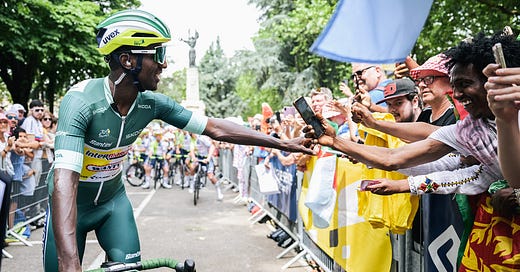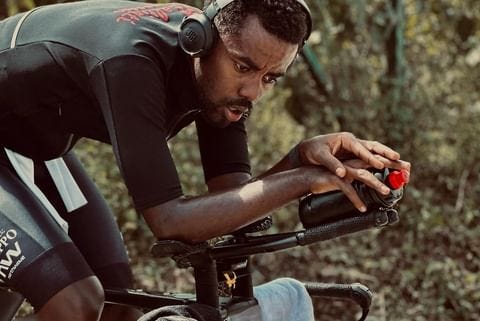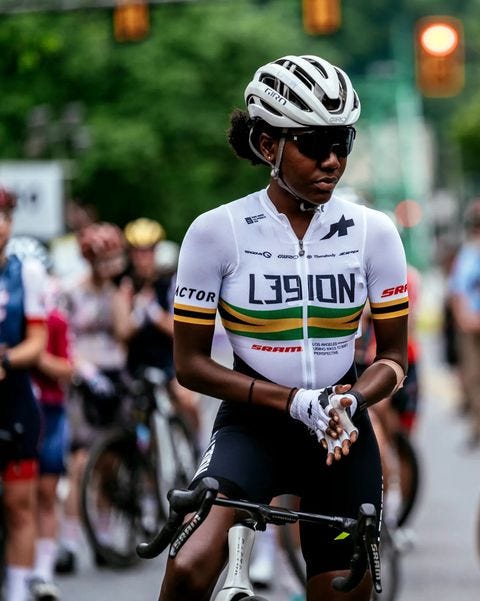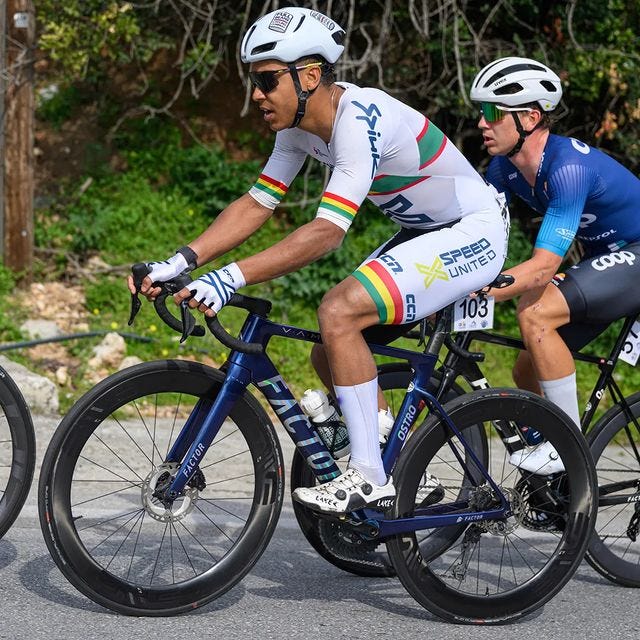'We Africans have never watched a black African rider win a stage in the Tour de France' - Three black riders on Biniam Girmay's impact
In their own words, Red Walters, Llori Sharpe and Kiya Rogora share their reflections on Biniam Girmay's Tour de France success, and what it might mean for diversity in pro cycling
‘Historic’ is a word that has been well worn over the last three weeks to describe Biniam Girmay’s 2024 Tour de France. His three stage wins are unprecedented as a black African, indeed as a black rider of any background.
As the Tour de France draws to a close, and as Girmay battles with Jasper Philipsen to close in on more history as the first African to win the Tour’s green points jersey - and just the fifth non-European - the question is, what impact is he having on the sport as a whole?
It is just thirteen years since the first black rider competed in the Tour de France. That was Yohann Géne of Europcar and France/Guadeloupe. 2015 was the first year that black Africans competed in the world’s biggest race, with Eritreans Merhawi Kudus and Daniel Teklehaimanot racing for MTN-Qhubeka - the latter would go on to become the first black rider to wear a jersey at the Tour, spending three days in the polka dots. (For a history of Africans in the Tour, I encourage you to read this Cyclingnews article from 2020.)
Despite the gains made in the past decade-and-a-half, cycling remains a sport dominated by white westerners. This is in spite of the sport’s popularity having stretched out over recent years to many parts of Africa, Asia and South America.
Many are hoping that this latest success will be the platform for greater diversity in pro cycling, particularly opening the door to black riders hoping to make it as professionals.
Kiya Rogora, Llori Sharpe and Red Walters are three black racers from different backgrounds. Below, in their own words, they share with Global Peloton their reflections on Girmay’s Tour success, what it means to them and what it might mean for diversity in the sport.
Kiya Rogora is a 21-year-old Ethiopian cyclist who previously rode for the EF-Nippo Development team before it folded at the end of last season. Last year, Rogora won the under-23 time-trial title at the African Continental Championships. Now, he is racing at national level in Italy for Maltinti Lampadari-Banca Cambiano, hoping to propel himself back to the Continental level. He says…
“It’s been inspirational… I had been expecting him to win a stage, but to win three stages in a single Tour de France so far is really surprising. We Africans have never watched a black African rider ever win a stage in the Tour de France.”
“In the mind, every African cyclist’s dream is to do the Tour de France. When it comes to becoming a stage winner it’s a little bit hard to believe in the mind so I mean he proved it all wrong and he showed it was possible.”
“So now the rest of the African riders are dreaming of doing the Tour de France, but we all are dreaming of making a stage win.”
“So in the mind, it really proves it's possible and it keeps much strength for Africans and what it can change in the cycling world. It has a huge, huge impact. He showed there is a talent in Africa.”
“I'm sure other teams will look to African riders starting from now and give them opportunities…and the things an Africa rider need to develop and to reach the highest level.”
“In my personal view, Bini has inspired me a lot since he won the under-23 [World Championship] silver medal in Belgium, and since then a World Championship race has been my dream race to win. He showed really crazy and unbelievable wins so far in Giro, in the Tour and this really gives you confidence, like a man from a neighbouring country wins in the biggest race in the world, and this gives you a boost.”
“Even I'm quite famous in my hometown, so people now ask is asking me, ‘you have seen Bini, so yeah, you have to be the next’.”
“He's a really big door opener for Africa. It's going to be a really big gate that has been opened by Bini. So thank you, Bini, thank you.”
Llori Sharpe currently races in the USA for leading criterium team L39ION of Los Angeles. The Jamaican national champion had previously ridden in Europe for the Canyon//SRAM Generation in 2022 and 2023 and was runner-up at last year’s Campeonato del Caribe. She says…
“Undoubtedly, Bini's triumphant wins at the tour have been a sight to behold and will forever be cemented in cycling's history.”
“For me, it meant a whole lot, as like many other black riders, seeing Bini achieve those victories evoked a sense of pride given how underrepresented we are in the peloton.”
“Simply seeing someone who looks like you attain a feat as significant as this is truly inspiring, and I can only hope that this opens doors for more black and other underrepresented people in the world of cycling.”
Red Walters grew up in the south of England, but now represents the country of his heritage, Grenada. Last year he took his first UCI win at the 2.2 Tour of Bulgaria alongside several other impressive results. Walters has previously ridden for Hagens Berman Axeon and has spent the last two seasons at Continental level with XSpeed United. He says…
“I would actually say it doesn't change a huge amount, personally. I've been a pretty big fan of Biniam since 2021. I think that was the year that he was second at under-23 Worlds and he'd done a couple of really good rides before.”
“I'd actually raced with him at the Brussels Cycling Classic when I had that chance with Hagens Berman. So that was pretty cool. Grom then I was like, yeah, this guy is, this guy's pretty cool. He's doing stuff that no one's doing, and he's looking like he's going to go far.”
“And then, of course, the Giro win. That was like, you know, on the world stage, getting a big win. That was really cementing it for me, and I think a lot of people as well. Now three stage wins. He's the dominant sprinter at the Tour de France. That sets him down as not just a good rider but currently the best sprinter in the Tour de France.”
“So I think that statement, ‘the best sprinter in the Tour de France’, I would hope that would send big waves down the community. It's quite good that everyone's talking about it, but also subconsciously that black riders can actually be at the top, not just like quite good, but at the top level of the sport, which I think is really important. Hopefully that sentiment trickles down through managers, through teams, all the way down to the grassroots level and into potential riders as well.”
“As for the changes that could be happening and need to be happening, I think, well, the World Champs is in Rwanda next year. That's quite cool. I guess all I can comment on in that respect is from my experience. There's not a lot of diversity.”
“It's obviously been getting better over the last five, ten years. There's definitely a big change…so for example, at Caribbean champs, there is a lot of stronger riders, a lot better riders, and that level seems to be coming up like a really nice rate. But as for recognition, that doesn't seem to be that much sort of like motivational movement to keep increasing diversity.”
“Everyone's like, ‘oh yeah, that's cool, Biniam did that. That proves it. That's great.’ There's not, from what I can see, there's not a huge amount of action on that.”
“I think there's definitely gradual change, but I guess we'll see in the next year or so if his results have actually proved anything and we'll see more black riders in the WorldTour and more diversity.”
How do you think Biniam Girmay’s success at the 2024 Tour de France will impact the sport of cycling?
Thanks for reading Global Peloton!
And if you’re feeling super generous, you can Buy Me a Coffee







